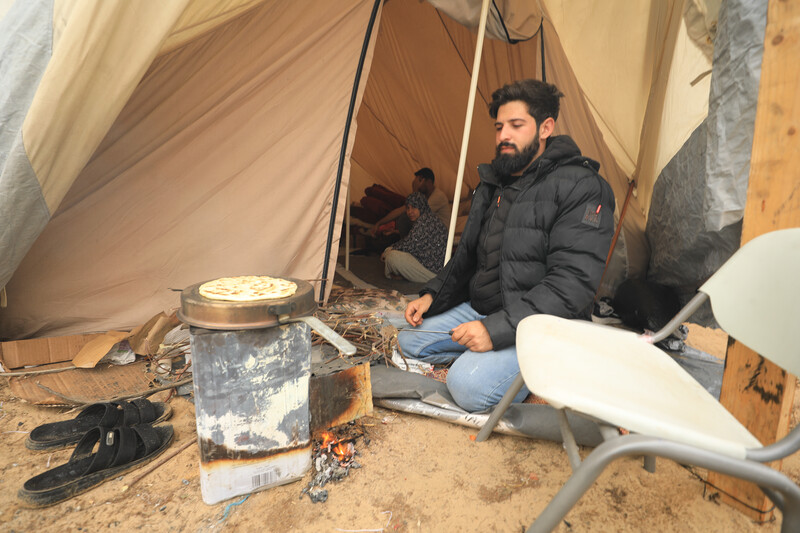The Electronic Intifada 5 December 2023

Displaced Palestinians, living in tents, struggle with cold weather and difficult conditions in Khan Younis, Gaza, 27 November 2023. (Salam Yasser / APA Images)
In the early morning hours, the smell of wood-burning fires rises from all directions in the southern town of Khan Younis.
The smell comes from the open-air ovens that Palestinians in Gaza are using to bake bread and to cook food. Once, you could walk down the street and buy bread from your neighborhood bakery, or cook your own bread in your own kitchen over a gas stove. Now, it is not so simple.
Suad Faraj, 55, now lives in a tent west of Khan Younis. Each morning when she wakes up, she searches for wood or anything else to burn in her fire, so she can make bread for her family. On this particular morning, she couldn’t find anything to burn.
“I never imagined that I would live in these difficult circumstances,” she said. “What we are living through is a painful nightmare, I wish it would end soon.”
She was forcibly displaced from her home in the Gaza City neighborhood of Tel al-Hawa by Israeli attacks.
“I came to the south to escape the continuous bombing that frightened us all day and night,” she said.
“Leaving behind our homes that had everything, we did not need anyone. Now we are waiting for aid from UNRWA [the UN agency for Palestine refugees] so that we can eat. I wake up at six in the morning because there is no calm in the place. More than a hundred families are next to me.”
“I felt homeless in the street”
Gaza’s 1.8 million internally displaced are struggling each day to find the essentials needed to survive. Food, water and gas have dwindled since the beginning of this war, when Israel intensified its already extant siege on Gaza.
An existence like Suad Faraj’s, where food, water and warmth are not guaranteed, is commonplace.
“We are in the winter season, and these fabric tents cannot protect us from heavy rain,” she said. “During the past two weeks, I lived through the worst days of rain and strong winds. I felt homeless in the street, with no place to shelter me. I could not find water to wash dishes and spoons.”
She deeply misses the days before the war, when she had access to a home full of everything she needed.
“I used to feel happy and safe in my house with my children and grandchildren,” she said. “Now I look at them with sadness and pity because we are unable to provide food or bread and water to drink. I cannot sit with my children as I did before.”
She can barely imagine what her grandchildren’s futures will look like.
A simple and safe life ruined
Khaled Mohsen, 59, was forcibly displaced to the UNRWA camp west of Khan Younis from Jabaliya.
“I had a full life in Gaza,” he said. “I work in the carpentry field. Our life is simple and safe. We left after the Israeli planes bombed the al-Sikka area in Jabaliya and there was a large massacre.”
They moved to the al-Saftawi area of Gaza, but it was also not safe there due to Israeli airstrikes. The family was then displaced farther south.
“We move on foot or by donkey cart,” he said. “We have returned to the old primitive life. We wait for the carts to take us from one place to another.”
Mohsen is in disbelief at the current state of his life.
“I cannot believe that I am in a tent without the necessities of life. I get bread with difficulty and eat with great suffering. There is no contact or communication with my family who is still in Jabaliya.”
He doesn’t know if his relatives are alive or if their homes have been bombed.
“I want to return to my home. I want to put this tent on the rubble. I cannot live away from my neighbors and my family. Israel forced us to leave our homes and carried out its threat to return Gaza to the Stone Age, and this is what we are living in.”
It’s the “collective punishment, genocide and destruction of an entire people,” he said.
Israel has taken away something from everyone
Rana Awad, 28, who lives in Khan Younis, said that her life is now reduced to trying to survive.
“Our day goes by trying to get what we need,” she said. “If you want to cook food, you need time because lighting a fire takes time, and in addition to that we need flour for bread, and bread also requires lighting a fire.”
“There is no time to sleep. The days go by very quickly and some of us do not know what date it is today.”
Mobile and internet connections are unreliable in Gaza, and Israel has destroyed many communications networks.
Awad ended up communicating with her cousin by letters transported by her father, since all other ways were too difficult.
“It’s a funny and painful situation that we are in this modern age, the age of technology, and we are losing our most basic rights to communicate with each other in this difficult war.”
“I do not think there are words that can describe what we are experiencing in this war,” Awad said. “There is no survivor in this war.” She means that Israel has taken something, or someone, away from everyone in Gaza.
Ruwaida Amer is a journalist based in Gaza.




